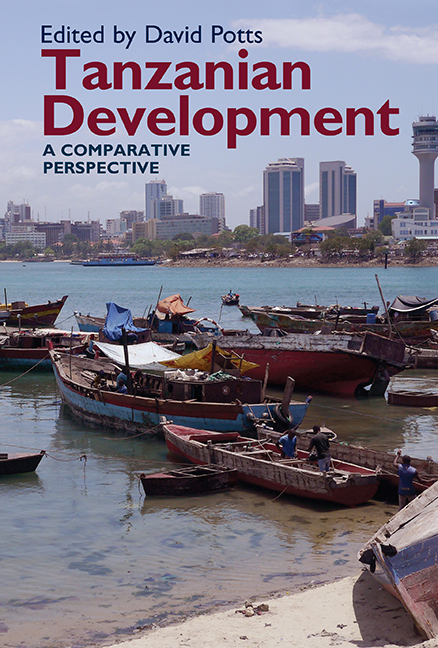Book contents
- Frontmatter
- Contents
- List of Illustrations
- Contributors
- Acknowledgements
- 1 Introduction – Tanzanian Development: A Comparative Perspective
- 2 The Political Economy of Tanzania 1967–2017: Reimagining the State
- 3 Reflections on the Tanzanian Trajectory: Decline and Recovery
- 4 Agricultural Development in Tanzania
- 5 Assets and Poverty Dynamics: The Methodological Challenges of Constructing Longitudinal Surveys in Tanzania
- 6 Contract Farming in Tanzania: Experiences from Tobacco and Sunflower
- 7 ‘We Just Sell Water – That is All We Do’: Two Cases of Small-scale Irrigation in Tanzania
- 8 The Industrial Development of Tanzania in Comparative African Perspective
- 9 Competitiveness in African Manufacturing: Some Evidence from Tanzania
- 10 ‘Good Life Never Comes Like Dreams’: Youth, Poverty and Employment in Arusha
- 11 International Aid to Tanzania – with some comparisons from Ghana and Uganda
- 12 Real Exchange Rate Changes and Export Performance in Tanzania and Ethiopia
- 13 Economic Leakage as a Constraint on Tourism's Effective Contribution to Local Economic Development in Tanzania
- 14 Extractive Industry Revenues and their Expenditure in Local Government Authorities: The Case of the Gold Service Levy in Geita District Council in Tanzania
- 15 Conclusion
- References
- Index
1 - Introduction – Tanzanian Development: A Comparative Perspective
Published online by Cambridge University Press: 24 October 2019
- Frontmatter
- Contents
- List of Illustrations
- Contributors
- Acknowledgements
- 1 Introduction – Tanzanian Development: A Comparative Perspective
- 2 The Political Economy of Tanzania 1967–2017: Reimagining the State
- 3 Reflections on the Tanzanian Trajectory: Decline and Recovery
- 4 Agricultural Development in Tanzania
- 5 Assets and Poverty Dynamics: The Methodological Challenges of Constructing Longitudinal Surveys in Tanzania
- 6 Contract Farming in Tanzania: Experiences from Tobacco and Sunflower
- 7 ‘We Just Sell Water – That is All We Do’: Two Cases of Small-scale Irrigation in Tanzania
- 8 The Industrial Development of Tanzania in Comparative African Perspective
- 9 Competitiveness in African Manufacturing: Some Evidence from Tanzania
- 10 ‘Good Life Never Comes Like Dreams’: Youth, Poverty and Employment in Arusha
- 11 International Aid to Tanzania – with some comparisons from Ghana and Uganda
- 12 Real Exchange Rate Changes and Export Performance in Tanzania and Ethiopia
- 13 Economic Leakage as a Constraint on Tourism's Effective Contribution to Local Economic Development in Tanzania
- 14 Extractive Industry Revenues and their Expenditure in Local Government Authorities: The Case of the Gold Service Levy in Geita District Council in Tanzania
- 15 Conclusion
- References
- Index
Summary
Tanzania today is in a much stronger position economically than at any time in the past, yet, as with many African countries, it is evident that this economic improvement is not evenly spread. Many people still struggle to achieve an acceptable standard of living and the rate of population increase remains relatively high, diluting the impact of economic growth on the improvement of living standards. This book examines the development of Tanzania from a range of perspectives and disciplines as well as different issues and sectors. Comparisons are also made with other relevant countries in a number of chapters.
Tanzania has maintained some form of parliamentary democracy continuously since independence, with competitive elections under a single party until 1994 and with a multi-party system subsequently. However, the advent of multi-party democracy has not, so far, resulted in any change of government, and claims of irregularities in the 2015 elections were made by Chadema, the main opposition party. The increasing significance of revenue derived from mineral wealth has also highlighted issues related to corruption. The authoritarian response taken by the government under President Magufuli, ostensibly to tackle corruption issues, has implications for wider issues of democracy and human rights and has been criticized, both by opposition parties and by Amnesty International.
Although largely stable internally, Tanzania has been affected at various times by conflict and instability in some neighbouring states. This has induced immigration from the countries affected by conflicts, including Rwanda, Burundi, the Democratic Republic of the Congo and Mozambique, as well as migration from Malawi mainly for economic reasons. Adverse economic consequences have also been experienced from the Uganda war (1978–9) and political disagreements with Kenya leading to the break-up of the East African Community from 1977 to 2000.
A number of important books have been published on Tanzania over the years. In the 1970s Lionel Cliffe and John Saul published their two volumes on Socialism in Tanzania (Cliffe and Saul 1972 and 1973). Their twin volumes covering both politics and the economy were important sources for students of Tanzania in the 1970s, generally sympathetic to the aims of Tanzanian socialism (ujamaa).
- Type
- Chapter
- Information
- Tanzanian DevelopmentA Comparative Perspective, pp. 1 - 11Publisher: Boydell & BrewerPrint publication year: 2019



